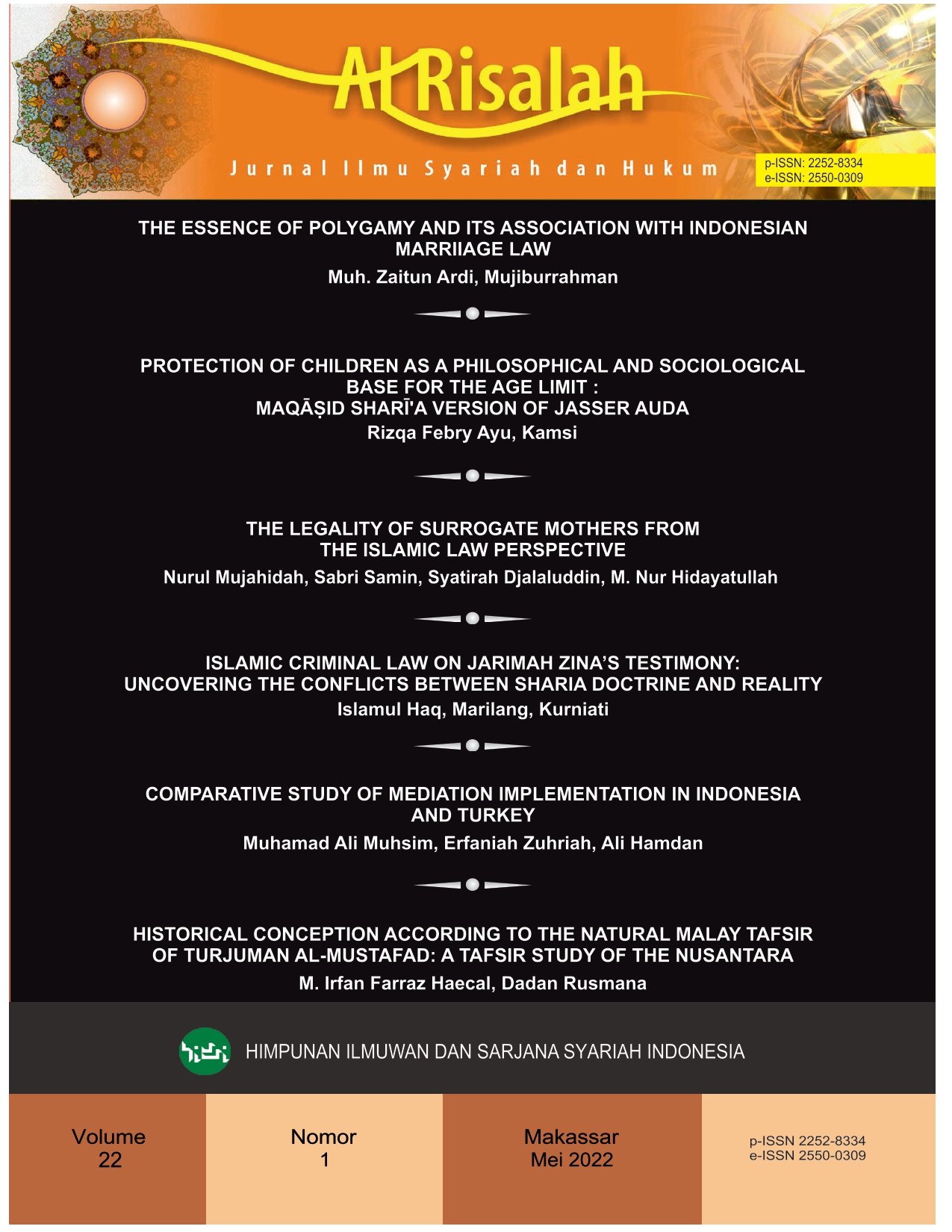THE LEGALITY OF SURROGATE MOTHERS FROM THE ISLAMIC LAW PERSPECTIVE
Abstract
This study aimed to analyze the legal standing of surrogate mothers from the Islamic law perspective. This study employed library research with a shar'i normative approach. The data were collected through documents related to the surrogate mother, both from books, texts (Qur'an and Sunnah), and scholars’ opinions who discussed the implementation of a surrogate mother. Surrogate mother was one of the efforts made by a married couple to produce descendants. The results of this study indicated that the law of having descendants in a marriage was not something included in the dharuriyyah part or must exist. Additionally, the legal consequences of implementing a surrogate mother would have an impact on the child born, both from the status of the child born from the surrogate mother including legitimate child or illegitimate child, who was the mother or the mother status of children born from the surrogate mother, and the rights inheritance of children born from surrogate mother. Therefore, based on the Qur'an and Sunnah, individual and group scholars' opinions stated that the legal standing of surrogate mothers in Islam was unlawful.
References
Al-Mubarak, Tawfique. “Surrogacy and Islam: Between Permissibility and Prohibition.” Islam and Civilisational Renewal 5 (2014): 277–81. https://doi.org/10.12816/0009843.
Al-Sajistani, Abu Dawud Sulaeman bin al-Asy’ab bin Ishaq bin Basyir bin Syidad bin ‘Amru al-Azdi. Sunan Abi Dawud. Beirut: al-Maktabah al-‘Asri, n.d.
Alimuddin, Harwis, and Tahani Asri Maulidah. “Implication of Local Wisdom in Islamic Law Compilation Legislation.” Mazahibuna: Jurnal Perbandingan Mazhab 3, no. 2 (2021): 143–58. https://doi.org/10.24252/mh.v3i2.24982.
Ameln, Fred. Kapita Selekta Hukum Kesehatan. I. Jakarta: Grafika Tamajay, 2020.
Amin, Muhammad Fatkhur Rizqi. “Analisa Yuridis Terhadap Perjanjian Sewa Rahim Dalam Perspektif Hukum Perdata Dan Hukum Islam.” Dinamika: Jurnal Ilmu Hukum 25, no. 5 (2020): 663.
Hori, Muhammad, and Eliva Sukma CIpta. “The Purpose of Marriage in Islamic Philosophical Perspective`.” Journal of Islamicate Studies 02, no. 01 (2014): 18–25. https://doi.org/https://doi.org/10.32506/jois.v2i1.505 The.
Indar et. all. Hukum Dan Bioetik Dalam Perspektif Etika Dan Hukum. II. Yogyakarta: CV Budi Utama, 2019.
Jadva, V. “Surrogacy Families 10 Years On: Relationship With The Surrogate, Decisions Over Disclosure And Children’s Understanding Od Their Surrogacy Origins.” Human Reproduction 27, no. 10 (2012).
Judiasih, Sonny Dewi. Aspek Hukum Sewa Rahim Dalam Perspektif Hukum Indonesia. Bandung: PT Refika Aditama, 2016.
Mohapatra, Seema. A Race to the Bottom? In Globalixation and Transnational Surrogacy in India. Lexington Books Plymouth UK, 2015.
Nurantiana. “Status Kewarisan Anak Yang Lahir Dari Hasil Sewa Rahim (Suroogate Mother) Menurut Hukum Perdata Dan Hukum Islam.” Journal of Lex Generalis (JLS) 1, no. 4 (2020): 574.
Pande, Amrita. Wombs in Labor Transnational Commercial Surrogacy in India. New York: Columbia University Press, 2014.
Passet-Wittig, Jasmin, and Norbert F Schneider. “Imaginability of Adoption, Foster Care, and Life without a(Nother) Child and Stress in Women and Men in Fertility Treatment.” Journal of Health Psychology 25, no. 10–11 (2020): 1462–71. https://doi.org/https://doi.org/10.1177/1359105318758857.
Rahayu Gorda, A.A.A.Ngr.Sri, Ni Ketut Elly Sutrisni, and I Gusti Agung Ayu Mas Triwulandari. “The Legal Status of Surrogacy Agreement According to Contract Law in Indonesia.” Jurnal Magister Hukum Udayana (Udayana Master Law Journal) 8, no. 4 (2019): 471. https://doi.org/10.24843/jmhu.2019.v08.i04.p03.
Rahman, Arif. “Al-Daruriyat Al-Khams Dalam Masyarakat Plural.” Mazahibuna: Jurnal Perbandingan Mazhab 1, no. 1 (2019): 25–41. https://doi.org/https://doi.org/10.24252/mh.v1i1.9664.
Selian, Muhammad Ali Hanafiah. “Surrogate Mother;Tinjauan Hukum Perdata Dan Islam.” Jurnal Yuridis 4, no. 2 (2018): 131. https://doi.org/10.35586/.v4i2.255.
Supardin, and Abdul Syatar. “Adultery Criminalization Spirit in Islamic Criminal Law: Alternatives in Indonesia’s Positive Legal System Reform.” Samarah: Jurnal Hukum Keluarga Dan Hukum Islam 5, no. 2 (2021): 913–27. https://doi.org/http://dx.doi.org/10.22373/sjhk.v5i2.9353.
Sutoyo, Anwar. “Human Dimension in The Perspective of The Holy Quran.” Internal Journal of Education 7, no. 2 (2014): 71–83.
Try. “Sewa Rahim Di Indonesia Dilakukan Diam-Diam.” Detik.com, 2010. https://health.detik.com/ibu-dan-anak/d-1370505/sewa-rahim-di-indonesia-dilakukan-diam-diam.
Widianti, Agnes. “Seperti Apa Sewa Rahim Di Indonesia: Ada Tapi Diam-Diam.” In Seminar Sewa Rahim. Semarang, 2010.
Zahrowati. “Bayi Tabung (Fertilisasi In Vitro) Dengan Menggunakan Sperma Donor Dan Rahim Sewaan (Surrogate Mother) Dalam Perspektif Hukum Perdata.” HOLREV 1, no. 2 (2017): 76.
Copyright (c) 2022 Nurul Mujahidah, Sabri Samin, Syatirah Djalaluddin, M. Nur Hidayatullah

This work is licensed under a Creative Commons Attribution-NonCommercial 4.0 International License.


